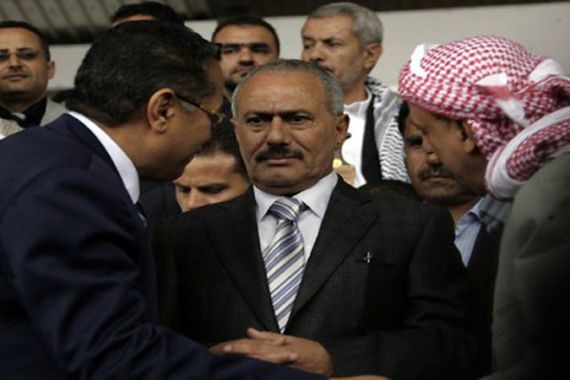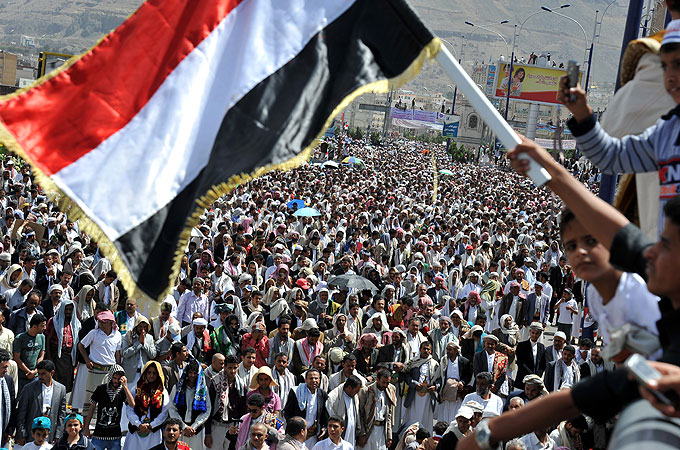Yemen rivals set to sign GCC-brokered deal
Weeks after rejecting an earlier deal, Yemeni president Saleh agrees to sign deal to transfer power.

 |
| American, European and Gulf diplomats persuaded Saleh and opposition groups to agree on a modified deal [EPA] |
Ali Abdullah Saleh, the Yemeni president, has reportedly agreed to sign a Gulf-brokered deal to transfer power.
The deal, which the opposition said would be signed later on Wednesday, would ease President Ali Abdullah Saleh out of power within a month after a nearly 33-year rule in the impoverished Arabian Peninsula state.
“After American, European and Gulf efforts, there was agreement by the president on the Gulf initiative after simple changes,” Yahya Abu Usbua, an opposition official, told Reuters news agency.
“The signing will be today,” Usbua said.
Al Arabiya television quoted an adviser to the Yemeni president as confirming the signing would take place on Wednesday.
The opposition, whose coalition includes Islamists and leftists, said that among the minor modifications in the deal were changes in who would sign and in what capacity for the opposition and for the government.
“The president will sign for the government in his capacity as president of the republic and as head of the ruling party,” Usbua said.
But some protest groups have said they won’t accept the Gulf Cooperation Council [GCC] plan.
The plan mediated by the GCC – a group of Gulf states – hit several snags in the past few weeks, with Saleh refusing to sign on technicalities.
Modifications proposed by the ruling party, passed on to the opposition by diplomats, would let the ruling party appoint a unity government for the transition period until elections and would also change which opposition representative would sign the deal, the opposition leader said.
Abdullatif al-Zayani, the secretary general of the GCC, has been in capital Sanaa since Saturday trying to revive the GCC-brokered deal that Qatar, one of its six members, backed out citingstalling and “lack of wisdom”.
Sustained protests
Saleh, who has outlasted previous opponents’ attempts to challenge his power, indicated in April he would sign the Gulf deal, but refused to put his name to it in the final hours.
 |
| For more on Yemen, visit our Spotlight page |
He said at the time he would only sign in his capacity as ruling party leader, not as president. He and his party have now agreed he would sign as president of both the party and the country.
The United States and neighbouring oil giant Saudi Arabia, both targets of foiled attacks from al-Qaeda’s Yemen wing, have been keen to see an end to Yemen’s political stalemate out of concern that continued chaos could give the group more room to operate freely.
On Tuesday, Yemenis marked 100 days of protest against the government.
In the southern port city of Aden, gunmen in civilian clothes fired into the air at a protest camp early on Tuesday morning.
Protesters said that this was an apparent attempt to scare them out of the area they have camped out for months, demanding Saleh’s immediate ouster.
Residents and medics said several were hurt but no one was killed. Fleeing protesters, some of whom hurled stones at their attackers, quickly returned to their camp after the clashes.
Elsewhere in the south, gunmen shot dead two soldiers and a civil servant as they drove up in a lorry to a security checkpoint in the southern city of Mukalla, a local official said.